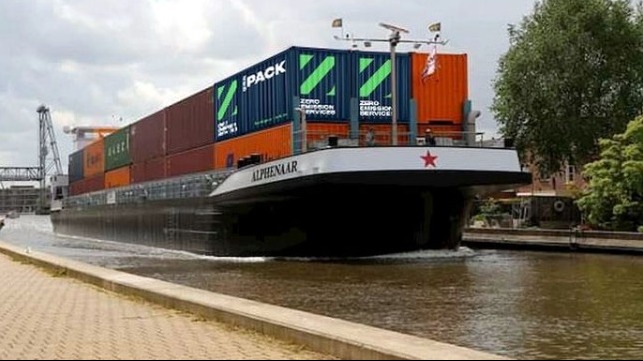Dutch Partnership Offers Battery Power for Inland Shipping

A new partnership is being launched in the Netherlands designed to make inland shipping more sustainable. As part of the overall drive to reduce the emission of greenhouse gases from the shipping industry, Zero Emission Services (ZES) will offer a complete range of products and services, based on interchangeable battery packs charged with renewable power, charging stations, technical support, and an innovative payment model initially focus on the inland container shipping segment.
It is estimated that inland navigation contributes about 5 percent of the carbon dioxide (CO2) emissions in the Netherlands while overall the Dutch transportation sector is responsible for 21 percent. Each container ship that switches from diesel fuel to ZES’s battery power, known as ZES-Packs, can reduce its carbon emissions by 1,000 tons per year.
“The Netherlands is a front runner in sustainable transport by water,” said Cora van Nieuwenhuizen, Minister of Infrastructure and Water Management. “Well over a third of all goods and 80 percent of bulk transportation takes place via inland waterways. Not only does this lessen truck transportation, which reduces traffic, inland vessels also emit significantly less CO2.”
Formed by The Port of Rotterdam Authority, financial giant ING bank, energy and technical service provider ENGIE, and maritime technology company Wärtsilä, ZES’s goal is to transform diesel-powered inland shipping to fully electrically powered transport. Heineken will be the company’s first customer, and by 2030, ZES expects that around 150 inland vessels will be powered by the new battery system.
"With ZES, we are introducing a systemic change in inland navigation, allowing barges to sail emission-free thanks to replaceable battery containers,” said Willem Dedden, CEO of Zero Emission Services. "We will start out using batteries, but if hydrogen becomes cheaper in the future, hydrogen technology-equipped containers will be able to supply power in the same way.”
The ZES-Packs will be charged with sustainably generated power and can be exchanged along a network of open access charging points. The ships will need to be equipped with an electric propulsion line, but to make the transition simpler for the shipping industry, ZES will use a 'pay per use'-based financing model where the shipper pays the cost of consumed energy and a battery container rental fee. ZES estimates that an inland vessel can travel 50 to 100 km on two charged ZES-Packs, depending on the currents and the vessel’s size and draught.
To support the system, the first ZES charging station will be at Alphen aan de Rijn. They envision gradually expanding the network of charging stations to form a national grid of approximately 20 charge points. Vessels using the system will swap out the battery packs at charging points not losing time by continuing to sail with new packs instead of waiting for the batteries to be recharged.
The HEINEKEN beer company has entered into an agreement with ZES to become the first user of the new system. Fitted with ZES-Packs, the De Alphenaar will be the first ship to use the system to transport beer from the HEINEKEN brewery in Zoeterwoude via the inland shipping terminal Alpherium to the port of Moerdijk. Five additional vessels will also be fitted with ZES-Packs during 2021.

that matters most
Get the latest maritime news delivered to your inbox daily.
In addition to the support provided by ING, ENGIE, Wärtsilä, and the Port of Rotterdam Authority, the Dutch government is providing a grant from the Ministry of Infrastructure and Public Works and a grant from the Rijksdienst voor Ondernemend Nederland supporting the goal of making transport more sustainable. The total cost is estimated at € 20 million for the first phase of the effort.
ZES plans to use this concept to move the entire inland navigation and short-sea sector toward emission-free sailing. Its longer-term goal is to set up an Amsterdam-Rotterdam-Antwerp corridor and making a connection to Nijmegen.
